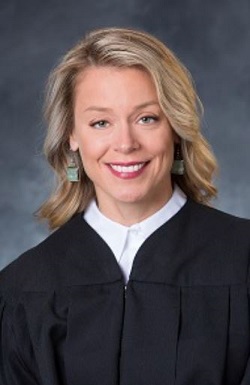In Minnesota, there are nearly 300 district court judges who preside over matters in ten judicial districts. While the Minnesota Rules of Court provide attorneys with significant information applicable to court proceedings, each judge may have his or her individual preferences with respect to motion practice and courtroom conduct.
In an effort to assist attorneys who may be appearing before a judge for the first time, the MSBA Civil Litigation Section Governing Council provided all district court judges with a brief survey. The responses that we received are organized on the right by judicial district and then alphabetically by judge’s name. We hope you find these responses to be helpful in your preparation for district court appearances.
For information about this project or to report an error in any judicial directory listing, contact Kara Haro, MSBA staff liaison to the Civil Litigation Section.
Sixth Judicial District Judges | Courtroom Preferences
Stumme, Rebekka
District Court Judge
Counties:Carlton
State Court Bio: View Bio

Motion Practice:
- Do you accept telephone calls from attorneys to rule on discovery disputes that occur during depositions? Yes
- How much time do you allot for motion hearings? It depends upon the type of motion, the length and number of motions. Typically an hour time slot unless more time or less time is requested by the parties.
- Set forth your practices and procedures with respect to attending a hearing by telephone or video conference. Contact Court Administration to receive information regarding the hearing, attend prepared and ready to address issues.
- Set forth your practices and procedures with respect to discovery motions. Same
- Set forth your practices and procedures with respect to stipulations of the parties, including stipulations for protective orders. Submit stipulations in writing, indicating that both parties agree with a requested procedure, copying the other party. Please submit a proposed order.
- Do you have particular requirements or procedures relating to requests to amend the scheduling order? No.
Written submissions:
- Do you want to receive paper courtesy copies of the parties' written submissions? If you do, set forth the number and preferred format of courtesy copies and identify any document type you do not want to receive. No.
- Set forth your practices and procedures for requests to deviate from the requirements of the General Rules of Practice for the District Courts. A written request and the reasoning behind the requested deviation from the rule is required.
In-court proceedings:
- Identify what technology you use in the courtroom and state whether you prefer a particular electronic format. Word.
- Set forth your practices and procedures with respect to attorney's use of technology in the courtroom and during trial. Nothing in particular.
- Set forth your practices and procedures with respect to the submissions of additional legal authority or other materials at or after oral argument. Submit by email the additional legal authority or other materials to the court, identified law clerk and opposing counsel.
- Do you permit parties to bifurcate oral argument so different attorneys address different legal issues? Yes
Pretrial procedures:
- Describe your preferred procedures for pretrial settlement conferences, including the timing of such conferences, persons who must attend, whether persons may attend by telephone or video conference, and how you participate in settlement discussions. All parties with settlement authority should attend the hearing or be readily available. The pretrial should be meaningful with the issues narrowed as far as possible. Chambers conferences with attorneys are preferred. This should occur approximately 30 days prior to a trial setting.
- Set forth your practices and procedures for handling motions in limine. Same.
- What is your schedule for a typical trial day? Attorneys and parties arrive at the courthouse no later than 8:30. All parties should be ready to proceed at 9:00 and be set up with the necessary technology by that time.
- Set forth your voir dire procedures. Typical.
- Set forth your practices and procedures with respect to courtroom decorum, including movement in the courtroom, use of a podium, whether attorneys should sit or stand, and how to address witnesses. Attorney's should stand to address the court, sit to question witnesses. Use of podium is permitted.
- Do you impose time limits with respect to opening statements and closing arguments? No
- Identify your practices with respect to the use of technology in the courtroom during trial. Approval ahead of time.
- Set forth your practices and procedures with respect to marking and using exhibits. Court personnel shall mark all exhibits ahead of the trial.
- Set forth your practices and procedures for handling objections. No arguing/speaking objections allowed.
- May attorneys obtain daily transcripts during trial? If so, what procedure should attorneys follow? Yes if my court reporter is in agreement, arrangements are made ahead of time, etc.
- Set forth your practices and procedures with respect to attorney requests to contact jurors at the conclusion of trial. Request list from court administration.